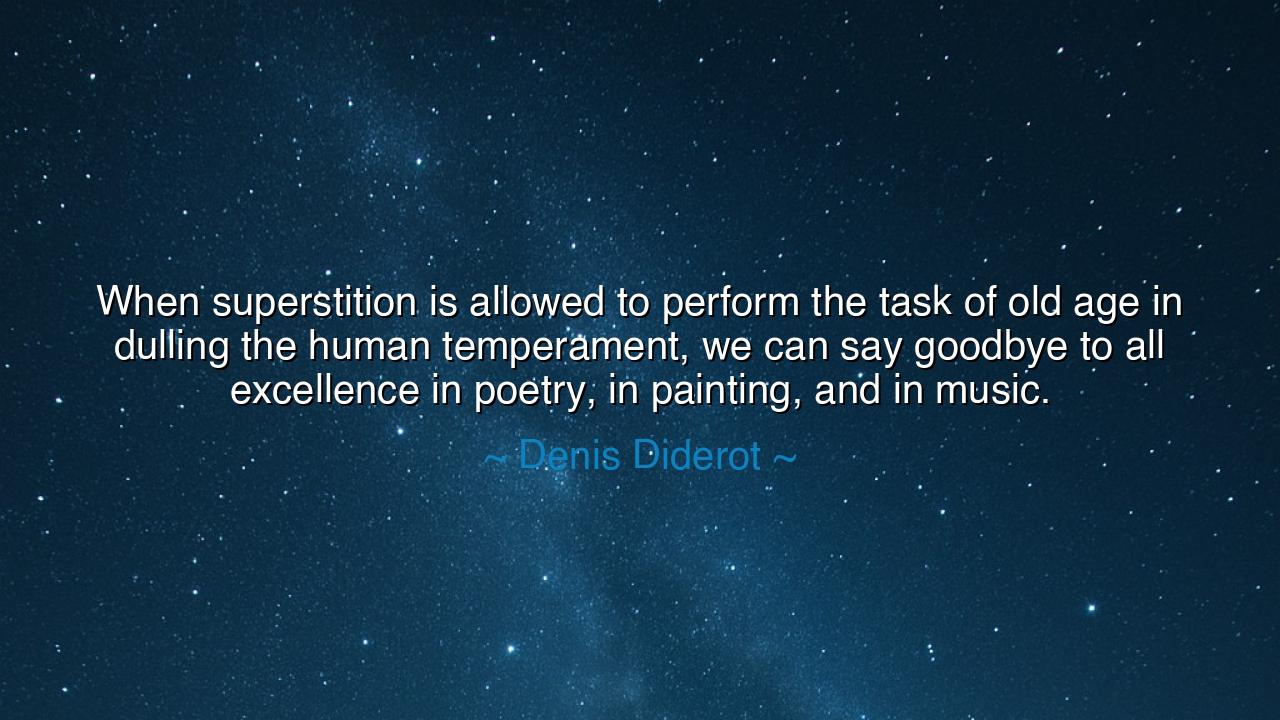
When superstition is allowed to perform the task of old age in
When superstition is allowed to perform the task of old age in dulling the human temperament, we can say goodbye to all excellence in poetry, in painting, and in music.






Denis Diderot, philosopher of light and fearless herald of the Enlightenment, once declared: “When superstition is allowed to perform the task of old age in dulling the human temperament, we can say goodbye to all excellence in poetry, in painting, and in music.” These words are not a simple warning but a battle cry, spoken against the chains that bind the human spirit. For Diderot saw that superstition, when permitted to rule the mind, corrodes the fire of imagination, drains the courage of thought, and leaves art pale and lifeless. It is not merely false belief; it is poison to the soul’s vitality.
The origin of this quote lies in Diderot’s struggle against the tyranny of dogma in 18th-century France. He lived in an age when the church, through fear and superstition, sought to dictate the boundaries of knowledge and creation. As one of the architects of the great Encyclopédie, he fought to free men and women from ignorance, believing that reason and freedom were the lifeblood of art. For he knew that to create beauty, the human spirit must be bold, unshackled, and alive with curiosity—yet superstition, like the weight of premature old age, dulls that spirit until it can no longer sing, paint, or dream.
Consider the story of the Italian Renaissance. In the centuries before its flowering, Europe lay under a heavy cloak of superstition and rigid dogma, a time often called the Dark Ages. Fear of heresy silenced thinkers, and the arts stagnated in repetition. But when reason awoke and the chains of superstition loosened, brilliance erupted: Michelangelo carved the very soul of man into marble; Leonardo da Vinci painted mystery into flesh and light; poets and musicians gave voice to passions that had long been suppressed. Here we see Diderot’s truth: where superstition reigns, art withers; where reason and freedom break through, excellence in poetry, painting, and music rises like the dawn.
The quote also speaks to the human temperament, that spark within us that longs for wonder and expression. Old age may slow the body, but when superstition performs the task of old age upon the spirit, it robs even the young of their fire. A man chained by fear of invisible powers, trembling at omens and curses, cannot lift his eyes to the heavens in wonder, nor capture beauty with brush or verse. True art requires boldness: the boldness to question, to imagine, to feel. Without this, the heart grows dull, and creation becomes empty.
The deeper meaning, then, is that freedom of thought is the soil of art. Truth and imagination walk hand in hand; when one is chained, the other falters. Diderot does not mock faith in beauty or mystery—he warns against fear disguised as faith, against blind belief that shrinks the soul instead of enlarging it. The artist, the poet, the musician must be unafraid to peer into the unknown, to challenge, to wonder. Superstition is the enemy of this courage, for it teaches submission instead of discovery.
The lesson for us is clear: if we wish to preserve excellence in art, we must guard our minds against the dulling hand of superstition. We must encourage curiosity, nourish reason, and allow imagination to roam free. For when we cling to fear and falsehood, we not only betray truth but suffocate beauty. And when beauty dies, humanity itself is impoverished, for without song, without vision, without poetry, what remains but silence and dust?
Practically, let us live as guardians of the creative spirit. Let us read not with blind obedience but with questioning minds. Let us welcome science not as an enemy of wonder but as its ally. Let us defend the artist’s right to challenge tradition, the poet’s right to speak uncomfortable truths, the musician’s right to stir forbidden longings. And in our own lives, let us resist the whispers of superstition that seek to make us timid, and instead cultivate courage, curiosity, and openness to the unknown.
Thus Diderot’s words stand as a torch for generations: “When superstition dulls the human temperament, we say goodbye to excellence in art.” May we never let the fire of humanity be dimmed by fear. May we rise in strength, so that our poetry remains fearless, our paintings radiant, our music eternal—expressions not of dulled spirits, but of souls awake, alive, and unafraid.






AAdministratorAdministrator
Welcome, honored guests. Please leave a comment, we will respond soon